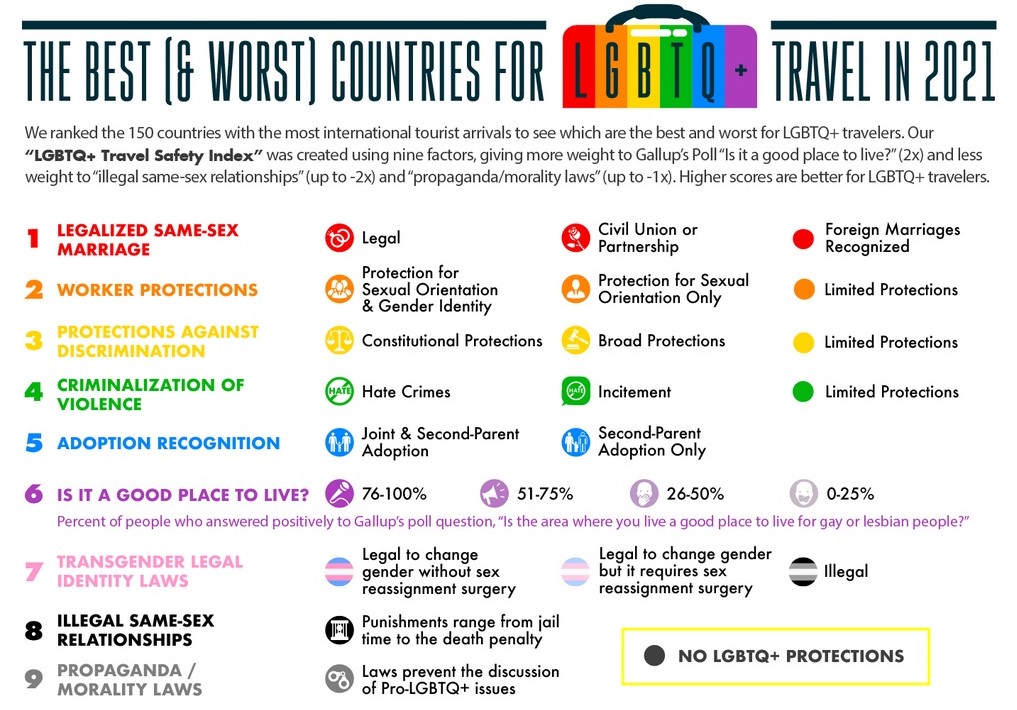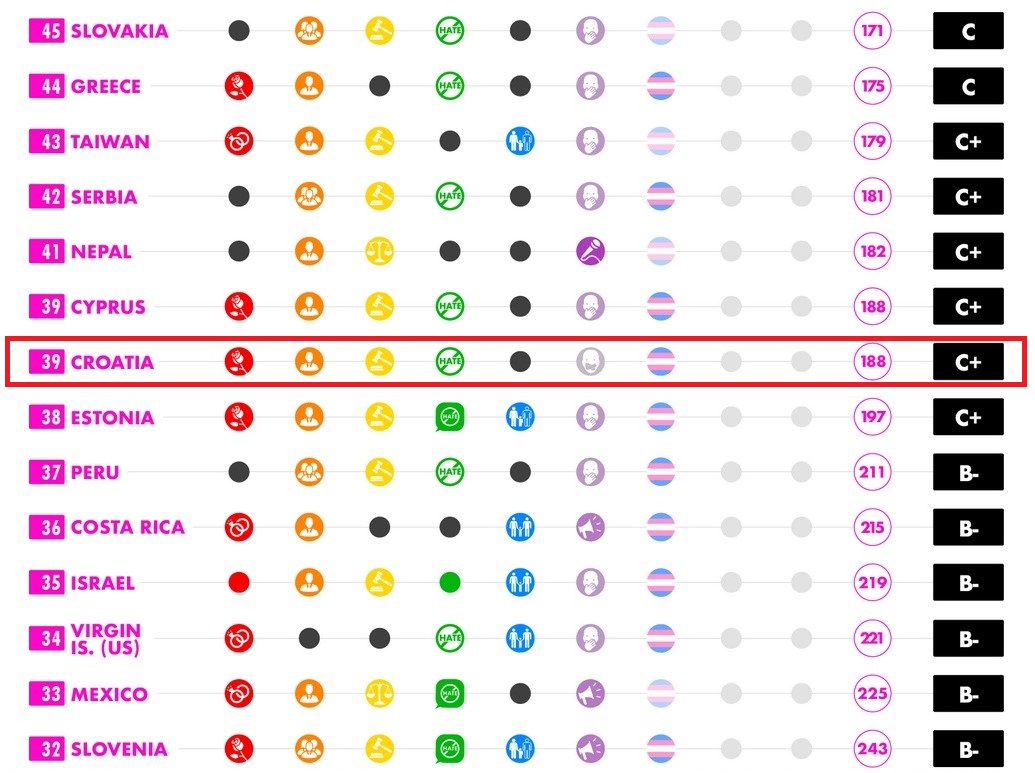LGBTQ Travel Safety in Croatia: 39th Most Popular Country in the World
March 9, 2021 – When it comes to traveling, Croatia has been known as a gay-friendly destination, even though not all Croatians in every part of the country are fond of accepting gay and lesbian couples. In a recent study, LGBTQ travel safety in Croatia ranks 39th on the list of 150 world's most popular countries for LGBTQ+ travel.
The research has been conducted by Asher and Lyric Fergusson, an Australian-American married couple, who write and do the research studies on topics that help travelers to travel safely. They have now taken an in-depth look at LGBTQ+ rights, country by country, reviewed individual laws and gathered data from various trusted international sources to create the definitive "LGBTQ+ Travel Safety Index" that shows safest, as well as least safe countries for LGBTQ+ travel.
After more than 250 hours of research, they made a list of 150 most (and least) popular countries, where Croatia took 39th place. We reviewed the information brought out about Croatia and added some useful information about LGBTQ+ communities in Croatia.
Croatia in the first third of best countries for LGBTQ+ safety
In a comprehensive overview, researchers listed 150 countries from worst to best regarding travel safety for LGBTQ members. The criteria according to which they made a list consists of ten critical factors:
- Legalized same-sex marriages
- Worker protections
- Discrimination protections
- Criminalization of violence
- Adoption recognitions
- Quality of life
- Transgender legal identity laws
- Illegal same-sex relationships
- Morality laws

Source: Asherfergusson.com
According to the data collected by these criteria, the researchers gave Croatia an index of 188 points and a grade C+ from most safe to highest dangerous places (A to F), placing it among the first third of the best countries in the world in terms of LGBTQ+ safety.
In Croatia, the same sex-relationships are legal since 1977. However, same-sex marriage or families are not permitted, but same-sex life partnership is (i.e., civil union). The Life Partnership Act came into force back in 2014, and since then, hundreds of life partnerships have been concluded, with male life partnerships being slightly more common than female. Also, it is legal to change gender without sex reassignment surgery.
Violence against the members of the LGBTQ community is considered a hate crime in Croatia. Although this study says only sexual orientation is protected in Croatia, the truth is, both sexual orientation and gender identity are protected by numerous Croatian laws. The protections against discrimination are broad, although not constitutional. Croatian Constitution still does not include same-sex families, defining marriage only as "a life-long community of woman and man." However, one year ago, the Constitutional Court gave the right to same-sex couples in Croatia to be foster parents. Before, only single gay people could adopt children.

Source: Asherfergusson.com
The top ten safest countries for LGBTQ+ travel are Canada, the Netherlands, Sweden, Malta, Portugal, Belgium, the United Kingdom, Spain, Norway, and France. At the very end of the list, being the world's least safe countries for LGBTQ+ travel are Nigeria, Saudi Arabia, Malaysia, Malawi, Oman, Jamaica, Myanmar, Qatar, UAE, and Yemen.
Interestingly, the study shows that less than 25 percent of people said Croatia was a good place to live, according to Gallup's poll question's votes. These statements are arguable since one can experience life and circumstances in Croatia only by visiting it personally. Nonetheless, many places in Croatia have been gay-friendly for a long time, especially tourist destinations.
LGBTQ-friendly destinations in Croatia
Among Croatia's popular tourist destinations, Dubrovnik is considered the most LGBTQ-tolerant, while its neighboring island of Lokrum welcomes gays on nudist beaches. Of other popular Croatian coastal destinations, Split, Rovinj, Krk, Rab, Rijeka, and Hvar also welcome members of the LGBTQ community. Rab island has also become the first declared gay-friendly destination in Croatia.
Naturally, any larger town in Croatia that depends on tourism is accommodating, and gay and lesbian couples won't face discrimination. Some even go that far as to say that Croatia is one of the most tolerant countries in Europe for LGBTQ+ travelers. Meanwhile, people in smaller towns in rural parts of Croatia, due to their high traditional and religious values, tend to be very judgemental.
Last year, Croatia saw 66 new same-sex life partnerships, increasing for as many as 47 life partnerships than in 2019. Most of them were registered in Zagreb and Primorje-Gorski Kotar and Istria counties. The first gay marriage was even held in Slavonia, in Kutjevo, where such marriages are still not very well accepted among citizens, which gained a lot of interest there.
Bigger cities such as Zagreb find same-sex marriages and LGBTQ communities acceptable, as proven by the Zagreb Pride celebration of many years standing, even in pandemic-marked 2020. Still, a recent horrific hate crime perpetrated in Zagreb's Maksimir Park against a gay man, when two attackers threw a Molotov cocktail on him and caused him second-degree burns. Zagreb Pride association later condemned the attack, calling it the "worst anti-gay hate crime ever reported in Croatia." They and such associations, most of which are located in Zagreb, are trying to improve the position of LGBTQ people in the community, i.e., in Croatia.
Pride celebrations have also been organized in Croatian cities of Split and Osijek, while some other supporting celebrations occasionally happened in Rijeka and Pula as well. Also, Croatia's numerous music festivals and carnivals always welcome LGBTQ music lovers.
Although not all Croatians are tolerant, nor does Croatia have all legal protections for gay or lesbian persons, it seems like times are slowly changing for the better in creating a safe and tolerant environment for LGBTQ+ people.
For the latest travel info, bookmark our main travel info article, which is updated daily.
Read the Croatian Travel Update in your language - now available in 24 languages.
First Gay Marriage Held in Kutjevo, Heart of Slavonia
November 5, 2020 - The first gay marriage held in Kutjevo was between locals from the area of Čaglin Municipality.
As the city clocks struck midday, two men, locals from the area of Čaglin Municipality said goodbyes to their single selves and embraced their future together as husband and, well, husband. Their affirmations were heard in front of the registrar of Kutjevo and thus, officially, they became partners in a same-sex marriage. It was the first gay marriage to take place in Požega-Slavonia County.
Portal Požega.eu reported that the intimate marriage ceremony of the 47-year-old and his 32-year-old partner took place over recent days, far from the gaze of the public. The ceremony was a quiet and private affair. In rural areas like Požega-Slavonia County, such marriages are not always met with widespread approval. The city registrar reported that this was the first gay marriage they had been asked to witness, despite having been in the job for many years.
Though this may be the first gay marriage to take place in Požega-Slavonia County, hundreds of same-sex marriages have concluded in Croatia since 2014, when the Life Partnership Act came into force. In the time since then, male same-sex marriages in Croatia have been slightly more common than female ones. The largest number of such marriages took place in Zagreb. From published figures outside of Croatia, where same-sex marriages have been more commonplace over a longer period of time, same-sex marriages are frequently more stable with fewer ending in divorce compared to traditional marriages.
Life partnerships in Croatia
The first same-sex marriage in Croatia was concluded in August 2014, and despite the great interest of the public, the two male partners managed to keep the wedding a secret. Just like the couple from Kutjevo. The couple married in the first of the ceremonies in Croatia only went public with details just last year.
"I was very nervous in those days, it was a historic thing after all. If we could not have done it in Croatia, we would certainly move to a country where it was possible," one of the spouses, Ivan Zidarević, told 24sata, adding that society has changed for the better with the change in the law.
Zidarević said he believes that Croats are tolerant of gay couples. Their marriage ceremony in 2014 was witnessed by two registrars, godparents, several friends, but also the then-Minister of State Administration, Arsen Bauk, initiator of the Croatian Life Partnership Act. Bauk gave the couple a symbolic gift – a pair of ties.
According to the Law on Life Partnership of Persons of the Same-Sex, a life partnership is a family community of two same-sex persons concluded by the competent authority (a registrar). The process of concluding a life partnership in Croatia is very simple. It is necessary to report to the registrar, who then checks whether the preconditions for concluding a life partnership have been met and takes a statement on the choice of surname. After that, the time and place of the ceremony are agreed, which, along with the registrar and partners, takes place in the presence of the godparents.
Happiness despite condemnations
At the beginning of this year, the Constitutional Court decided that same-sex couples in Croatia have the right to be foster parents under the same conditions as everyone else. However, the current constitutional definition of marriage in Croatia does not include same-sex families. A change to legally recognise married same-sex partners in this way was this year demanded by the participants of Zagreb Pride, held on September 19, 2020. Pride organisers said that without a change in the recognition, state authorities are still restricting the rights of gay people and making them second class citizens.
In many EU countries, and more so in Zagreb here in Croatia, same-sex marriages are acceptable and almost every day. But, in rural areas such as Požega-Slavonia County, Kutjevo, and other places like these, such marriages are still of great interest and not universally embraced.
Although they live in an environment where they might encounter condemning views, the happy couple from Požega-Slavonia County decided to legalize their relationship. In comments on Facebook, people wished them luck, and one commenter jokingly wrote: "If they didn't make a toast with Graševina, they didn't do anything. Congratulations anyway!"
For the latest travel info, bookmark our main travel info article, which is updated daily.
Read the Croatian Travel Update in your language - now available in 24 languages
Gay Couple Foster Two Children after Years of Struggling - Newspaper
ZAGREB, Sept 6, 2020 - Ivo Segota and Mladen Kozic, a gay couple, foster two children after years of struggling, Vecernji List daily said on Sunday.
"No comment. We want to keep the children anonymous," Segota said in a message when asked to comment on the news broken by the 24sata news website.li
Both men have received the necessary training and know what is in the best interest of the children. They are aware that revealing any information about the children they have provided with a temporary home and stable environment could hurt the children themselves, and the public interest could put fostering in jeopardy, Vecernji List says.
Kozic and Segota entered into a life partnership five years ago, deciding to become foster parents three years ago. They underwent the necessary psychosocial tests and at no point was their sexual orientation raised as an issue, the newspaper said, adding that social workers wish for more young, highly-educated foster carers living in urban areas. However, their application was unexpectedly rejected last November on the grounds of being gay.
For the latest travel info, bookmark our main travel info article, which is updated daily.
Read the Croatian Travel Update in your language - now available in 24 languages


